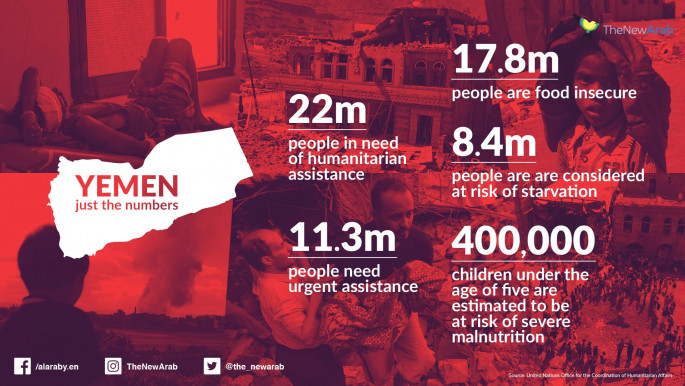
Aid to Yemen is meaningless as long as weapons sales continue
On the agenda was the tragic and spiraling situation in Yemen, where, a representative for the World Food Programme noted that along with its partners the UN organisation was "barely containing this catastrophic situation," and without adequate and sustained resources to carry out an ambitious plan to scale-up activities to reach nearly 40 percent of the population, more Yemenis would reach "the brink of death."
As the conflict entered its fourth year, more than 20 million people in the country faced debilitating food insecurity.
At its conclusion, Mark Lowcock, Emergency Response Coordinator for the UN humanitarian system, remarked that the 40 pledges made that day totaled US$2.62 billion, or more than half of the overall funding required to execute Yemen's Humanitarian Response Plan in 2019.
Saudi Arabia and the United Arab Emirates, who have invested heavily in military intervention in the conflict, stood out among a handful of countries that had expanded their funding from the previous year, with a 30 percent increase in pledged funds from 2018.
No mechanism exists for ensuring that such pledges, which amount to official statements of intent, materialise into actionable contributions. In the months since the February conference, the large sum promised by the Saudi coalition has not come through, and reports of an increase in "death by cholera" are circulating in the media, yet again.
 |
Saudi Arabia has spent most of the duration of the conflict in Yemen physically barricading the passage of aid |  |
The conflict in Yemen matches many conventions of contemporary warfare, including the excessive targeting of civilian infrastructure and use of collective punishment, even as military technology has become more precise.
In Syria, Bashar al-Assad uses starvation as collective punishment in his brutal assault on the Syrian people. Israel has cynically co-opted scientific advancements in crisis monitoring and nutrition management for its strategic agenda through a policy to count and restrict the caloric value of food items permitted through the Gaza blockade. Its parameters, outlined in what became known as the Red Lines document, ensured Gaza would subsist on the brink of collapse.
Saudi Arabia has spent most of the duration of the conflict in Yemen physically barricading the passage of aid.
 |
|
Its naval blockade of the Hodeidah port has persisted, despite continued promises to lift it. As the crisis escalated toward famine, the blockade restricted food aid and chlorine tablets for purifying contaminated water from the weakening population, even as the coalition carried out airstrikes on water treatment facilities.
At its epidemiological peak, one million Yemenis suffered from Cholera, a preventable disease capable of killing within hours of contraction.
Until recently, United States and United Kingdom arms sales to the Saudi coalition had continued with little oversight.
The high toll of civilian casualties eventually moved lawmakers to acknowledge the role of the United States in Yemen, and to take a stand against US refueling of coalition jets.
The US senate failed in July to override a presidential veto on arms sales to Saudi Arabia, a deal worth US$8.1 billion on the table. Saudi Arabia's portion of the Washington deal outlines a special cooperative deal between Riyadh and Raytheon, a major US arms manufacturer to co-design precision bomb parts.
 |
While humanitarian aid keeps people alive, it is insufficient for a society to thrive |  |
And in June, a UK appeals court called for review of 4.7 billion pounds in arms deals with Saudi Arabia, after determining there had been insufficient assessment of the risk of civilian harm in previous sales.
A UN expert panel concluded that UK technology used in a September 2016 bombing of a Yemen water facility violated international humanitarian law, in the month before Yemen officials announced a Cholera outbreak was underway.
The Saudi coalition's failure to deliver on its promise of humanitarian assistance has also coincided with a shift in coalition strategy and cohesiveness in Yemen.
The UAE has recently drawn down its troop presence, leaving behind a mash-up of trained militias and other fighters in the south, where separatists aligned against the Houthis have taken control over the southern port, straining their relationship with Saudi Arabia.
Read more: Yemen rebels destroy 'gone off' food aid
The kingdom now faces the prospect of spreading too thin, and jeopardising its credibility with the government of Abd-Rabbu Mansour Hadi.
While humanitarian aid keeps people alive, it is insufficient for a society to thrive, or to begin rebuilding life-sustaining infrastructure. Spending the entire US$4 billion sum attached to the 2019 humanitarian response plan would prevent additional casualties that are made certain in the absence of funding, but would do little to mitigate the violence experienced on a daily basis.
Given the stated priorities of US President Trump, and UK Prime Minister Boris Johnson to push arms deals, and in light of the earnest acquiescence the US State Department has shown Mohammad Bin Salman on matters ranging from military strategy to the murder investigation of US resident Jamal Khashoggi, the outlook remains bleak.
To achieve progress in Yemen, mounting concerted international pressure must trump raising hopes at the next pledging conference.
Rose Worden is a researcher and writer based in New York. She holds a Master's Degree in International Affairs from The New School and is focused on development and security in the Horn of Africa and MENA.
Follow her on Twitter @rswrdn
Opinions expressed in this article remain those of the author and do not necessarily represent those of The New Arab, its editorial board or staff.





 Follow the Middle East's top stories in English at The New Arab on Google News
Follow the Middle East's top stories in English at The New Arab on Google News


